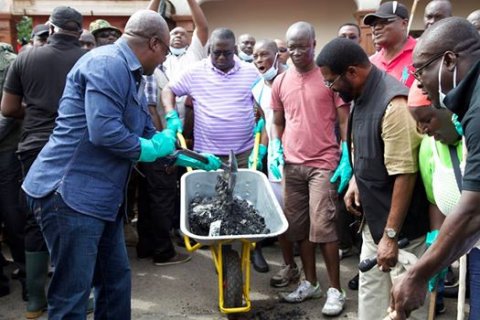 The first round of the National Sanitation Day was climaxed
at the Brong Ahafo region, having travelled all the ten regions of Ghana. This
initiative, no doubt is a monumental exercise that shouldn’t be left to die out. Rather, it should be promoted to ensure that
the country rid of filth that is gradually becoming a mental tumor in our
country’s quest to remain clean.
The first round of the National Sanitation Day was climaxed
at the Brong Ahafo region, having travelled all the ten regions of Ghana. This
initiative, no doubt is a monumental exercise that shouldn’t be left to die out. Rather, it should be promoted to ensure that
the country rid of filth that is gradually becoming a mental tumor in our
country’s quest to remain clean.
The Ministry of Local Government and Rural Development, as
well as the good people of Ghana who made time out of their busy schedules to partake
in the exercise in this first round should be commended for their unrelenting
effort so far.
The National Sanitation Day was initiated at the heels of
the outbreak of cholera which claimed so many lives in the country. Like the proverbial vulture who always decides
to build its shed when the rain sets in and forgets thereof when the rain
subsides, it is often said that Ghana is quick to react when a disaster strikes
but relaxes thereof as soon as the problem is over. But in this instance, the programme is still
ongoing and I pray that it defies this Ghanaian notion.
Several programmes have been launched by successive
governments since independence but many of such programmes often experienced a
shorter lifespan because of apathy and lack of enforcement.
Although the National Sanitation Day has been largely successful so far, they’ve been many reported news stories about the level of apathy that is gradually lacing its boot to cripple this laudable initiative.
For us to sustain this initiative, fast-forward, the Ministry
of Local Gov’t and Rural Development should endeavor to increase public
education on the need for people to volunteer their time and energy during this
important national exercise. This would convince more people to see the
exercise as a national exercise worth sacrificing for rather than a political one.
Government should also consider passing a law that will give a
legal arm to the exercise and compel people to actively engage in the exercise.
Defaulters of the law should be punished to serve as deterrent to other people.
Growing up as a child, there were Sanitary Inspectors who were much dreaded
each time they went on an inspection exercise and whipped discipline into
people. A law will give a similar force to this exercise.
The Local Gov’t Ministry should also seek private
partnership, where private sector workers would also take a front-lead role in
the exercise. The ministry could also get sponsorship packages which may come
in the form of T-shirts, hand gloves, pick axes, dustbins etc. Awards scheme could also be instituted to recognize
regions and organizations which give massive participation, as well as
individuals who dedicate themselves to the exercise.
Media organizations, institutions of higher learning, celebrities
and the civil society should take active role during the exercise to conscientise
the ordinary citizens that the exercise is a national affair and should be seen
as such. If the ordinary citizens see doctors, lawyers, media practitioners, musicians,
actor/actresses, etc join the campaign, it will renew ordinary citizen’s spirit
of nationalism and dedication which is currently waning in the exercise.
Ghana can only move forward if we eschew apathy, politicization of national
issues and sabotage. We need to imbibe
the spirit of volunteerism in the younger generation so that people will learn
how to die a little more for our dear nation. As the former US president, John
F. Kennedy was famously quoted, “ask not what your country can do for you-ask
what you can do for your country”. God bless our homeland Ghana!
Writer: Abdul-Karim Mohammed Awaf
Service Personnel: Graphic Communication Group Limited
Accra-Ghana
Writer: Abdul-Karim Mohammed Awaf
Service Personnel: Graphic Communication Group Limited
Accra-Ghana